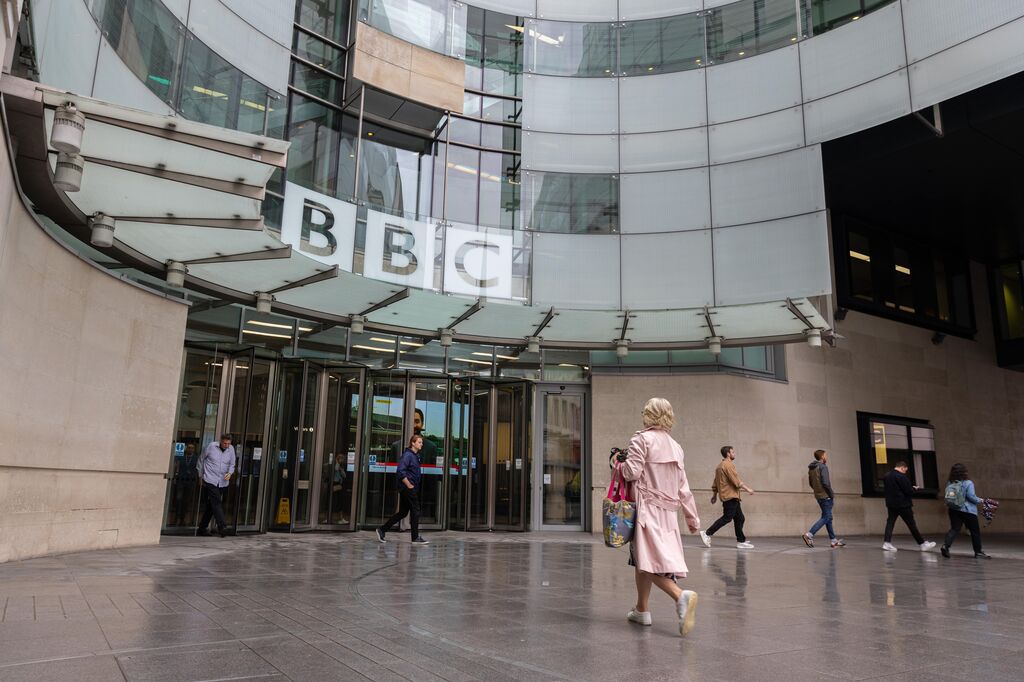The week when 'Thought for the Day' became front-page news...

Disclaimer: CARE is politically-neutral; the views contained in this blog are those of the author, and do not reflect the organisation as a whole.
It’s not every week that ‘Thought for the Day’ makes front-page news. Part of the ‘Today Programme’, the slot has its origins in 1939, when it was called ‘Lift up your Hearts’ and was designed to provide Christian encouragement during the Second World War.
The programme has evolved in the decades since; not all of the speakers today are Christians (although many still are), but generally the programme now features a relatively gentle, religious reflection, lasting 2 minutes and 45 seconds, about the world around us. Hardly the sort of thing which makes headlines.
Lead headline on ‘The Telegraph’ website on Wednesday: “BBC pulls Thought for the Day after guest brands Jenrick ‘xenophobic’”.
Front page of ‘The Mail’ on Thursday: “BBC climbs down over ‘xenophobe’ slur on top Tory”.
Yes, you might be able to guess why those papers particularly highlighted the story…! But similar stories were run by the BBC, the Guardian, Sky News, GB News and the rest.
The segment began by talking about fears in life. So far, so uncontroversial. But then it moved into the area of immigration:
“A front page story in the Mail on Sunday quoted shadow justice minister Robert Jenrick talking about his fears for his young daughters. He said: ‘I certainly don’t want my children to share a neighborhood with men from backward countries who broke into Britain illegally and about whom we know next to nothing.’ These words echo a fear many have absorbed. Fear of the stranger. The technical name for this is xenophobia.
All phobias are by definition irrational. Nevertheless, they have a huge impact. It is understandable that many people are scared by the unknown, especially if they’ve been told illegality and unfairness are part of the story. However, over the past year, xenophobia has fueled angry protests outside hotels housing asylum seekers, deepening divisions in our communities.”
It finished by drawing on the example of Martin Luther King, who spoke of “Children from all races walking hand in hand in peace”, and pointed people to Christian teaching about loving our neighbour and welcoming the stranger.
After the segment was broadcast, Robert Jenrick complained on the social media platform X (formerly known as Twitter), leading to the BBC removing the references to ‘xenophobia’. Of course, if the BBC thought any content was not suitable, perhaps it should have been edited out in advance of broadcast…
The speaker in question was Dr Krish Kandiah, who will be familiar to many of us, and who is a long-standing friend of CARE.
Krish is someone for whom I have much respect; he has long been a winsome Christian communicator in the public square. The fostering organisation he founded, ‘Home for Good’, has helped hundreds (if not thousands) of children. He has worked tirelessly on behalf of refugees, including from Ukraine, Hong Kong and Afghanistan.
He is also a Christian brother; this means that I want to be doubly-sensitive. As Christians, we will always have some things on which we disagree; and yet there will always be far more on which we do agree. We have a shared worldview; the Bible-story is the lens through which we view the world around us, and everything in it.
The Bible has much to say about how we speak about other believers; in Ephesians 4:1-3, we read: “I urge you to live a life worthy of the calling you have received. Be completely humble and gentle; be patient, bearing with one another in love. Make every effort to keep the unity of the Spirit through the bond of peace.”
With that in mind, I hope that anything I write here will represent Krish fairly and charitably. Any points at which I disagree are meant in a spirit of grace. And I did send this piece through to Krish in advance, as a mark of honour to a fellow believer.
A small spark and a forest on fire
As Christians, we believe that words matter. James writes: “Likewise, the tongue is a small part of the body, but it makes great boasts. Consider what a great forest is set on fire by a small spark.” (James 3:5).
Words particularly matter when people are in positions of power, or have a platform, because then their reach is far greater. And for all that the attention has been on ‘Thought for the Day’, it is worth looking at the original words Robert Jenrick wrote in his column for ‘The Mail on Sunday’.
Jenrick is an abrasive politician; his rhetoric style could (politely) be described as punchy. Time in opposition has served him well; he is about the only Conservative figure to have cut through in recent months, and he is heavily rumoured to be in line to succeed Kemi Badenoch, potentially after next year’s local elections.
At CARE we consistently bang the drum for “truth and grace”; it is worth reflecting on whether some of these statements meet that standard.
Consider this paragraph: “In just the past two months we have seen a spate of crimes, all allegedly committed by migrants”. Blaming the ‘other’ is the oldest political trick in the book; I studied Classics back when I was at university, and it is remarkable how little politics has changed in some ways from the world of Ancient Rome!
Similarly: “I certainly don’t want my children to share a neighborhood with men from backward countries who broke into Britain illegally and about whom we know next to nothing.”
Let’s just break that down.
“Men”. A large majority of people crossing in the small boats are men. But among immigrants as a whole, the percentage is more like 50/50.
“From backward countries”. That’s pretty inflammatory, especially given the list of the top 5 countries people came to the UK from in 2024 includes India, China (including Hong Kong) and Ukraine.
“Broke into Britain illegally”. No one disputes that illegal immigration is occurring (and most people think we should do more to stop it!). But in the minds of many today, small boats = immigration, when the vast majority of people come here legally. In 2024, there were 43,630 detected irregular arrivals in the UK. The total net migration figure to the UK in 2024 was 431,000.
In Robert Jenrick’s piece, he flits between talking about legal and illegal migration. And of course, if you meet someone who has migrated here in the street, you have no way of knowing either way. That is why the rhetoric of the piece matters: if you are encouraged to view the ‘other’ as a potential criminal, you will always be on your guard.
Words matter. And they particularly matter within the context of a country where tensions, in some parts at least, are increasingly high. Riots last year at Southport. Threats to burn down hotels housing asylum seekers. Now violent protests in Epping.
“A great forest is set on fire by a small spark”. If we are to talk about immigration responsibly, we have to use our words carefully; not unnecessarily inflaming tensions for political gain; always being clear what precisely we are talking about; and recognising the innate humanity (not the innate criminality!) of every human being, who is an image-bearer of God, and of infinite dignity and worth.
An irrational fear?
So if the tone of Robert Jenrick’s initial remarks was wrong, what about the invoking of xenophobia from Krish? (It’s worth saying that Krish didn’t technically call Jenrick ‘xenophobic’, although I do think it was hard for a listener to not take that as the inference.)
Here is what Krish said: “These words echo a fear many have absorbed. Fear of the stranger. The technical name for this is xenophobia. All phobias are by definition irrational.”
He continued: “The idea that they pose a greater risk to our children than those already within our communities isn’t supported by evidence. Most crimes against children are committed not by strangers, but by people they know, often from within their own families or neighborhoods.”
It is here where the picture becomes more complicated. Because I’m not convinced that the way Krish has laid this out fully does justice to what the data is saying.
Multiple things can be true simultaneously; Krish is absolutely right that most crimes against children are committed by people they know. (Similarly, most sexual abuse cases are committed by family or friends.)
But it is also true that the most recent statistics show that crimes are over-represented amongst foreign nationals: the Centre for Migration Control found that foreign nationals are responsible for 15% of crimes, despite representing just 9% of people.
It is worth saying that some of these figures are disputed: there is disagreement over whether it is better to use ‘country of birth’ or ‘nationality’. That is why Nigel Farage, using the latter, claims that an Afghan male is 22x more likely to be convicted of sexual assault than a British male.
But even on the former, there is still a noticeable difference. Daniel Dunford, a senior data analyst at Sky News, wrote last week: “Our analysis…shows there is likely a significant difference in offending rates among Afghans compared with Britons - but not to the extent described by Mr Farage. Our estimates conclude that Afghans are actually three times more likely to be convicted of a sexual offence than someone born in the UK, rather than 22 times.”
If we believe in both ‘grace’ and ‘truth’, I don’t think we are well-served by simply putting inconvenient facts to one side. (Although I do appreciate that 2 minutes 45 seconds doesn’t give Krish the same leeway as a 2500-word article!)
To give one example (and this is not what Krish did) I have found myself frustrated when people essentially say ‘Nothing to see here’ over cases like the Pakistani grooming gangs in Rotherham; some might remember how the Leader of the House of Commons, Lucy Powell, when questioned about it, responded, "let's get that dog whistle out shall we.”
The question is one of proportion: one study showed that between 1997 and 2017, in Rotherham, 1 in 73 Muslim men were prosecuted over the case. The Labour MP for Rochdale, Simon Danczuk, who championed victims and brought forward whistleblowers, said that “senior Labour politicians” told him not to mention “the ethnicity of the perpetrators, for fear of losing votes”.
I don’t believe we serve anyone if we don’t take things like that seriously. And I don’t think it is unfair to be nervous around certain cultural backgrounds either.
Every immigrant is an individual, yes. But each of us are shaped by the cultural forces around us. The claim that ‘not all cultures are equal’ might be controversial; but not all cultures are equal, because not all values are equal. As Christians, we believe God has laid out his wisdom for human flourishing in his Word, the Bible. And of course, all societies - including our own - fall short of God’s vision for what a truly flourishing society would look like.
But Tom Holland has made the case that we live in a ‘Christian’-infused world; the Jesus-revolution led to radical notions like the equality of all, the dignity of women, protecting the vulnerable, and eventually things like human rights; none of these were self-evident in the Greco-Roman world of the time, and they still aren’t in some places today. ‘The air we breathe’ might be Christian here in the UK; but it isn’t everywhere.
Competing tensions
Immigration is a complicated subject to think through Christianly; we cannot draw a straight line from Old Testament Israel to 21st Century Britain. Concepts like ‘nations’ or ‘borders’ were far more fluid.
But that does not mean the Bible has nothing to say either. The theologian Mike Bird has a helpful phrase: ‘The Bible was written for us, but it was not written to us’. The world we live in may be different, but there are always principles we can take from Scripture.
As Christians, we need to think about, amid the tensions of the debate, what a better story for immigration is today, rather than subscribing to the simple dichotomies of open borders or a hostile environment.
I want to suggest three principles as we try and navigate that; all three have to be held in tension, because there are not simple solutions to complex problems!
1. Governments have a right to say no
Some people suggest that governments have a duty to take any and everyone who seeks to migrate. But I am not convinced that is right; in the Old Testament, private property was protected, and borders were marked out with boundary stones. When migrating, it was customary to ask permission from the local lord (who had a right to say no); for example, in Numbers 20, we read about how Moses asked to pass through Edom; when his request was declined, he ultimately turned the Israelites around.
Governments have certain duties to their citizens: to promote good, and to restrain evil. We read in Romans 13:4: “The one in authority is God’s servant for your good.” There may be many reasons why a government decides to say no to immigration: social cohesion; a housing crisis; wanting particularly skilled workers.
Regardless, the Government’s decision is to be respected. Romans 13:1: “Let everyone be subject to the governing authorities, for there is no authority except that which God has established.”
Perhaps an interesting question might be this: when do you think the UK government should say no to prospective immigrants?
2. We must treat immigrants who live here fairly
The Bible emphasises that we have a particular duty to care for the vulnerable: in the Old Testament, emphasis is placed upon four main groups: the poor, the widow, the orphan and the foreigner, sometimes known as ‘the quartet of the vulnerable’ (eg. Zechariah 7:10).
The word typically translated as ‘foreigner’ is the Hebrew ‘ger’, meaning ‘resident alien’. (Whatever other Scriptural precedent there might be for welcoming foreigners who are here illegally, or foreigners who are here to work for a short time, these verses don't provide it.)
The Old Testament concentrates less on whether resident aliens should be allowed to come, but on how they should be treated when they are here. On this, God was clear: they were to be treated the same as someone born in Israel, with access to the same legal protections. This was different to the laws in the surrounding nations.
At a time where there is a danger of backlash against anyone who has migrated to Britain (even those who are British citizens), we would do well to remember God’s words in Leviticus 19:34: “The foreigner residing among you must be treated as your native-born.
3. The importance of grace
If there is one thing which should distinguish the life of a Christian, it is grace: the demonstration of love, regardless of what someone deserves, which we received ourselves through the cross.
Krish helpfully ended his segment by pointing to Christian teaching to “love thy neighbour”. This is not just a soundbite: the most extended passage around neighbourly love comes in Luke 10, in the Parable of the Good Samaritan. The Samaritan acts in a very practical way to help the injured Jew, binding his wounds, bringing the man to an inn, and paying for his care.
In essence, it is a story of grace, for someone who is culturally, nationally and religiously different.
Grace does not necessarily look like raising the numbers of people we take into this country (although it might mean that sometimes, particularly if people are fleeing war, such as schemes to house Ukrainians). But it does mean doing something.
One thing the media have not covered was Krish’s recent work on behalf of children who were medically evacuated from Gaza; he organised a collection to provide essential clothes, toys, and toiletries. As he himself posted on X, “These children have experienced hell on earth, and thanks to you, we got to give them a little taste of heaven.”
Sometimes, it might look like aid to people where they are; the backlash against foreign aid (both here and in the USA) is a source of great regret to me. The UK International Aid budget was cut from 0.7% of gross national income under the Conservatives; now, under Labour, it will be reduced to 0.3% from 2027. Inevitably, there will be flaws in any aid programme (for any programme is affected by sin, just like everything else), but I am deeply concerned by a trend which conflates America (or Britain) First as America Only.
Governments have a right to say no. We must treat immigrants who are here fairly. And Christians should be people of grace.
It’s not the solution. But it’s a start.






